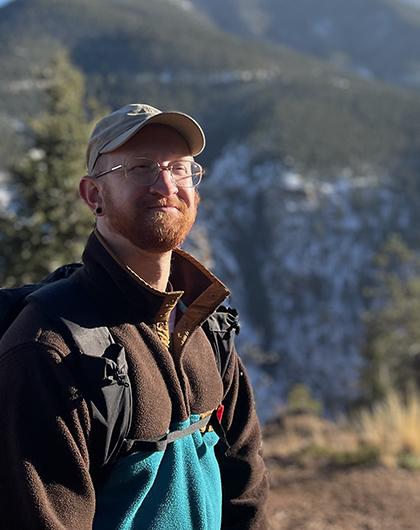Scholars
Dylan M. Harris
University of Colorado Colorado Springs
Based in
United States
North America
Dylan M. Harris is an assistant professor of geography and environmental studies at the University of Colorado Colorado Springs (UCCS). His work focuses on environmental problems like climate change and energy, and he is interested in the capacity of stories to engage with – and potentially shift – environmental knowledge in regions, and with people, who are among the most vulnerable to matters of environmental, energy, and climate justice.

Country(ies) of Specialty
United StatesFocus areas of expertise
Communications research Climate Justice Fossil fuels Renewable energyPublications
Articles
Harris D. M. & McCarthy, J. 2023. A Just Transition to What, for Whom, and by What Means? Transition Technology, Carbon Markets, and an Appalachian Coal Mine. Energy Research and Social Science. https://doi.org/10.1016/j.erss.2023.103307.
Harris, D.M. and D. Santos. 2023. A Case for Speculative and Experimental Political Ecologies. .Journal of Political Ecology. https://doi.org/10.2458/jpe.5589.
Harris, D. M. 2023. Storytelling, Crisis, and Meaning-Making: Stories as a Terrain of Cultural and Political Struggle. cultural geographies. https://doi.org/10.1177/1474474022114755.
Harris, D.M. 2022. Climate Storytelling. EBSCO Pathways to Research – Sustainability.
Harris, D.M. 2022. Energy Justice. EBSCO Pathways to Research – Sustainability.
Harris, D.M. 2022. The Trouble with Modeling the Human into the Future Climate. GeoHumanities. https://doi.org/10.1080/2373566X.2022.2043764.
Moulton, A., S. Velednitsky, D. M. Harris, C. B. Cook., and B. Wheeler. 2021. Unsettling Political Ecology: Toward More Honest Dialogues on the Legacies of Trauma in Political Ecology. Journal of Political Ecology. 28: 1, 677-695. https://doi.org/10.2458/jpe.3051.
Harris, D. M. 2021. Realizing Where I Should Be: Notes on Reflexivity and Positionality in Fieldwork. The Geographical Bulletin. https://www.gammathetaupsilon.org/the-geographical-bulletin/2020s/volume62-2/A/article6.pdf.
Harris, D. M. 2021. Storying Climate Change: Notes on Experimental Political Ecology. Geoforum. 126, 331-339. https://doi.org/10.1016/j.geoforum.2021.08.011.
Pettibone, L. and D. M. Harris. 2021. Kollaboratives Utopisieren für ein klimaneutrales 2030. Ökologisches Wirschaften. https://doi.org/10.14512/OEW360324.
Harris, D. M. & McCarthy, J. 2020. Revisiting Power and Powerlessness: Speculating West Virginia’s Energy Future and the Externalities of the Socioecologial Fix. Environment and Planning E: Nature and Space. https://doi.org/10.1177/2514848620935751.
Harris, D. M. 2020. Expanding Climate Futures: Using Science Fiction’s Worldbuilding to Imagine a Climate-Changed Southwestern U.S. Otherwise. Literary Geographies. 6:1, 59-76. https://www.literarygeographies.net/index.php/LitGeogs/article/view/190.
Harris, D. M. 2019. Telling stories about climate change. The Professional Geographer. https://doi.org/10.1080/00330124.2019.1686996.
Harris, D. M. 2017. Telling the Story of Climate Change: Geologic Imagination, Praxis, and Policy. Energy Research and Social Science. 31, 179-183. https://doi.org/10.1016/j.erss.2017.05.027.
Harris, D. M. 2017. Mountain-Bodies, Experiential Wisdom: The Kallawaya Cosmovisíon and Climate Change Adaptation. Third World Thematics. 2: 2-3, 376-390. https://doi.org/10.1080/23802014.2017.1347057.
Harris, D. M, 2015. A Primer on Gramsci, Culture, and Climate Change. Green Social Thought. 68, pp. 8-10.


